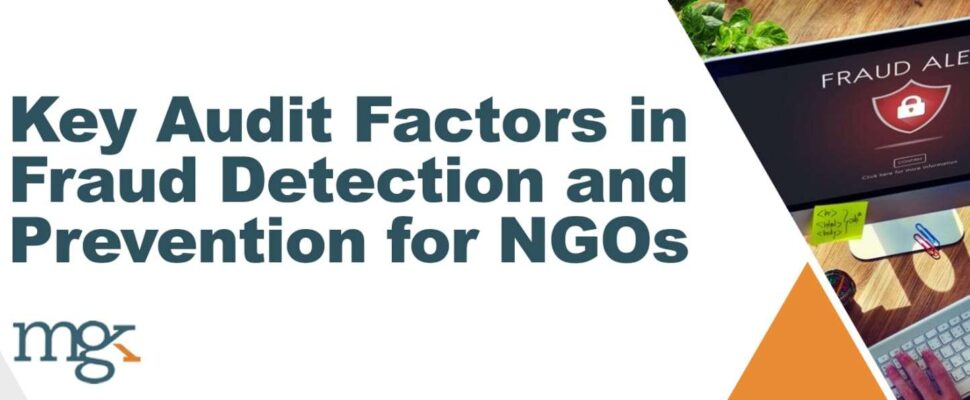Non-Governmental Organizations (NGOs) play a crucial role in addressing social issues, promoting charitable causes, and advancing global development. However, like any other entity, NGOs are vulnerable to the risk of fraud. Fraud can not only result in financial losses but also damage the organization’s reputation and undermine its mission. Therefore, implementing effective fraud prevention and detection measures is essential for ensuring the integrity and transparency of NGO operations.
Some key audit considerations to enhance fraud prevention and detection in NGOs include the following
-
Establishing a Strong Control Environment
A robust control environment sets the foundation for fraud prevention. It involves creating a culture of ethical behavior, accountability, and transparency within the organization. The board of directors and management should lead by example and communicate zero tolerance for fraudulent activities. Policies and procedures must be established to govern financial transactions, expense approvals, and vendor relationships. Additionally, segregation of duties should be maintained to prevent any single individual from having complete control over financial processes.
-
Conducting Risk Assessments
Conducting regular risk assessments is crucial for identifying and understanding the organization’s vulnerabilities to fraud. The audit team should evaluate the nature of NGO activities, financial processes, and potential fraud schemes. A risk-based approach will allow auditors to focus on high-risk areas and allocate resources more effectively. Key risk areas may include cash handling, payroll, procurement, grant management, and fundraising.
-
Implementing Whistleblower Mechanisms
NGOs should establish effective whistleblower mechanisms to encourage employees, volunteers, and stakeholders to report suspicious activities without fear of retaliation. An anonymous reporting system can help in uncovering potential fraud and misconduct within the organization. The audit team should verify the existence and effectiveness of these mechanisms during their assessment.
-
Reviewing Financial Controls
A comprehensive review of financial controls is essential for fraud prevention. This involves examining the authorization and approval processes for financial transactions, ensuring that proper documentation is maintained, and verifying that expenses align with the organization’s objectives. Auditors should also assess the use of financial systems and technologies to identify any potential weaknesses or vulnerabilities.
-
Monitoring Donor Funds and Grants
NGOs often rely on donor funds and grants to carry out their activities. It is crucial to ensure that these funds are used for their designated purposes and that proper accounting practices are followed. The audit team should verify compliance with grant requirements, assess the effectiveness of monitoring mechanisms, and check for any indications of misuse or misappropriation of funds.
-
Reviewing Procurement Processes
Procurement is another area susceptible to fraud, as it involves the selection of suppliers and vendors. Auditors should examine procurement policies, bidding processes, and supplier evaluations to identify any signs of collusion or favoritism. Ensuring competitive bidding and transparent procurement practices can help mitigate the risk of fraud in this area.
-
Conducting Surprise Audits and Inspections
Surprise audits and inspections can act as a strong deterrent to potential fraudsters within the organization. These unannounced assessments can help auditors observe daily operations, evaluate adherence to policies and procedures, and identify irregularities that may not be apparent during regular audits.
-
Performing Data Analytics
Leveraging data analytics can significantly enhance fraud detection capabilities. Auditors can use data analysis tools to identify patterns, anomalies, and red flags in financial transactions. By analyzing large datasets, auditors can quickly spot unusual activities and investigate further if necessary.
-
Information Technology Systems and Data Security
NGOs should ensure that their information technology systems and data security measures are reviewed to safeguard against data breaches and unauthorized access to sensitive information.
-
Staff Training and Awareness
NGOs should enhance their efforts to train employees in fraud prevention and detection. Raising awareness about fraud risks and preventive measures is crucial to building a vigilant workforce.
-
Third-party Due Diligence
NGOs should work with partners or subcontractors, and perform due diligence to ensure they have proper controls and ethics in place.
-
Board Oversight
There should be an enhanced board oversight in fraud prevention and detection efforts. Board members should be actively involved in setting the tone for ethical behavior and promoting a culture of transparency and accountability and risk management.
Conclusion
Preventing and detecting fraud in NGOs is a collective responsibility that involves the commitment of the board, management, employees, and auditors. A proactive approach, including a strong control environment, risk assessments, whistleblower mechanisms, and effective financial controls, is crucial for safeguarding the organization’s assets and reputation. Regular audits, surprise inspections, and data analytics further strengthen the NGO’s ability to identify and address fraudulent activities promptly. By adhering to these key audit considerations, NGOs can maintain their integrity, foster donor trust, and continue making a positive impact on society.
MGK has a dedicated internal audit team with a pool of skilled forensic accountants and internal auditors who have been supporting organizations to uncover financial irregularities, fraud, and embezzlement as well as identify weaknesses in internal controls that may be exploited for fraudulent activities.
We welcome an opportunity to discuss with you this important topic and the support that we could offer you.
For more information, visit our website https://www.mgkconsult.co.ke/contact-us , or email info@mgkconsult.co.ke


Share this: